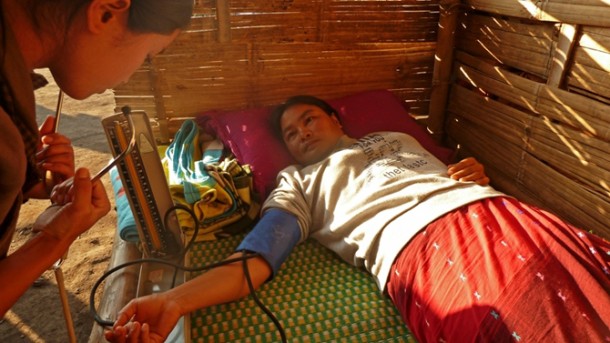The health conditions of displaced villagers in Kachin State are deteriorating and dozens of children are suffering from diarrhea, a local doctor said on Thursday, adding that three infants had already succumbed to the illness this week.
Dr. Seng Mai, who works at Laiza Hospital, said many young children were brought to the hospital in recent days with diarrhea, adding that since early January about 100 such cases had been treated.
However, some of the infants could not be saved as they were brought to the hospital too late, she said, adding, “Three children died this week and we are treating ten children today.”
Dr. Seng Mai said poor living conditions in the camps, such as overcrowding and a lack of hygiene, were contributing to the spike in child disease, adding that many children also suffered from minor health complaints like skin rash and coughing.
Local priest Father Stephen Zaw Min Latt said that he knew of at least one more child death due to diarrhea among villagers who were staying at the local Catholic Church.
He said there had been a noticeable spread of the illness among young children. “I met several children who are suffering diarrhea,” the priest said. “Five out of six mothers I talked to said that their children, who were under three years of age, are suffering from it.”
Father Min Latt said there had also been an increase in the number internally displaced persons (IDPs) and new arrivals had been forced to seek refuge in the Baptist Church and a Catholic Church as two other IDP camps in Laiza were full.
Some of the new arrivals were now falling ill due to the tough living conditions, but as there were no clinics in the churches some of the villagers there had to travel to the other IDP camps or Laiza Hospital, he said.
Doi Pi Sa, who heads the Kachin Relief and Development Committee, said the number of internally displaced persons in Kachin rebel-controlled camps had risen with some 10,000 new arrivals in recent weeks, and the total number now stood at 70,000 IDPs.
In government-controlled parts of Kachin State there are believed to be another 40,000 displaced Kachin families.
The increase in IDPs was caused by the fact that Laiza residents were registering themselves in camps as they lacked food and other supplies, Doi Pi Sa said.
Many of the new arrivals came from Laiza’s Phar Kyan Kyawt quarter, which was evacuated after it was shelled by the Burmese military on Jan. 14, he added.
The UN has repeatedly requested access to the rebel-held camps in order to provide humanitarian assistance, but the Burmese government has blocked UN access to northern Kachin State since June last year. As a result, local NGO are struggling to supply the camps with food, medicine and shelter.
Doi Pi Sa said another big concern was the threat posed by nearby, as battles between the Burmese army and Kachin rebels were raging at less than 7 kilometers away from the IDP camps.
“We worry about their security as the Tatmadaw’s columns are really close, but we have nowhere to go other than staying in our place here,” he said.

















